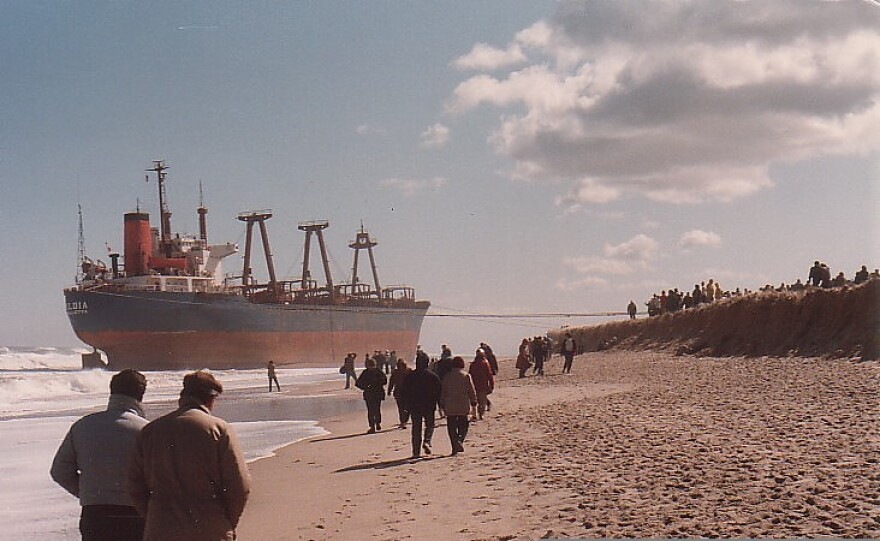It was thirty years ago this week that I learned a lesson about the Outer Beach that I have lived by ever since. It was this: never, ever make a public prediction about what will or won’t happen there.
On March 29, 1984, I went out to Coast Guard Beach with a Boston television crew from Channel 5 to videotape a program about barrier beaches and how they cope with storms and erosion. At one point the interviewer asked me about the history of wrecks along this shore and whether they still occurred. I said no, we didn’t get wrecks along here very much any more, big ones anyway. The Cape Cod Canal, electronic and satellite weather forecasts and navigation equipment, had changed all that.
This is part one 0f a three-part recollection of the stranding of the freighter Eldia. Part 2 is here.
That was Wednesday. By late Thursday morning the winds had increased to fifty knots, with higher gusts. At 4:53 pm, on March 30, 1984, the Eldia, a 451-foot Maltese-registered freighter, empty of cargo and carrying no ballast, was blown ashore on Nauset Beach in Orleans. She beached about a mile south of the Nauset parking lot and some five miles south of where, in my interview just the day before, I had assured the public that large wrecks no longer occurred on the Outer Beach.
The following morning I drove down to the Nauset parking lot. It was already crowded with vehicles. Even from a mile away, the ship’s great blue and red hull and massive trapezoidal loading rigs rose impressively, incongruously, above the dunes like an apparition. Hundreds of people were converging towards this immense, unexpected visitation. There were crowds of older retirees, young couples with squalling infants, high school students whose parents thought they were in class, working men and women – all borne along by the wind and our curiosity. We brought our wonder, our unaging appetite for spectacle, to this fantastic apparition, this visible manifestation of the massive traffic of the sea come ashore, this, the largest vessel ever to strand on the Outer Beach.
The great ship sat sideways against the beach, with her starboard side landward, about 200 feet above mean low water. It seemed impossible that anything so huge could have been carried so far up the beach, but her hull was empty and, drawing only five feet of water, she had floated like a balloon on the surface of the sea. She seemed completely deserted - a present and a presence beyond our expectations, at once resigned, enchained, and majestically self-possessed and mysterious. Anyone or anything might be aboard.
The Eldia sat, if not quite high and dry, at least in soft, seemingly safe sands. In a way it was no more of a spectacle than it would've been if she had been docked at a pier. One visitor was reported in the newspaper as commenting, “It looked much bigger on TV.”
Although her hull was empty of cargo, she carried considerable fuel oil of her own, and there were rumors of a crack forming in the hull. Yet there was no apparent damage to the vessel, and it seemed as if she were simply the victim of some trivial mistake, waiting only for the next tide take her back out into the high seas. As it turned out, The Eldia would remain aground on Nauset Beach for nearly two months, during which time she would become a major local tourist attraction, a boon to local businesses, and an environmental headache.
This is part one 0f a three-part recollection of the stranding of the freighter Eldia. Part 2 is here.
Audio of this essay is posted below.







